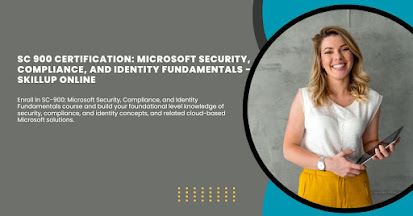In the ever-evolving landscape of technology, Docker course has emerged as a transformative force, revolutionizing the way we develop, deploy, and manage applications. As businesses across the globe seek to enhance their operational efficiency and stay competitive, mastering Docker has become an indispensable skill. At SkillUp Online, we recognize the significance of this technology, and in this comprehensive guide, we will equip you with the knowledge and skills you need to excel in Docker.
Understanding Docker - Unleashing the Power
The Essence of Docker
Docker, in its essence, is an open-source platform designed to automate the deployment of applications in lightweight, portable containers. These containers, unlike traditional virtual machines, share the same operating system kernel, making them incredibly efficient and versatile. Docker simplifies the development and deployment of applications, providing a consistent and reliable environment for your software to run.
Key Benefits of Docker
Docker's rise to prominence can be attributed to its myriad of benefits. It offers:
- Portability: Docker containers can run on any system that supports Docker, ensuring consistent performance across different environments.
- Isolation: Containers provide isolation, preventing conflicts between applications and enabling you to run multiple services on a single host.
- Resource Efficiency: Unlike VMs, containers use fewer resources, allowing you to maximize server efficiency.
- Rapid Deployment: Docker containers can be deployed in seconds, significantly speeding up development and testing processes.
- Scalability: Docker facilitates easy scaling of applications to meet the demands of your growing business.
Getting Started with Docker
Setting Up Docker
Before diving into Docker, you'll need to set up the environment. Docker supports various platforms, including Windows, macOS, and Linux. Here's a quick guide to get you started:
- Install Docker: Download and install Docker for your specific operating system from the official Docker website.
- Verify Installation: After installation, open your terminal and run docker --version to ensure that Docker is properly installed.
- Hello World: Begin your Docker journey by running the classic "Hello World" container using the command docker run hello-world.
Docker Basics
Images and Containers
In the Docker ecosystem, images and containers are fundamental concepts:
- Images: Images are read-only templates used to create containers. They contain everything needed to run an application, including the code, libraries, and dependencies.
- Containers: Containers are instances of Docker images. They are lightweight, portable, and run consistently across various environments.
Dockerfile
A Dockerfile is a script that defines how a Docker image is built. You can think of it as a recipe for creating your containers. You'll often create custom Dockerfiles for your applications to ensure reproducibility.
Running Your First Container
Now, let's run a practical example to illustrate Docker's power. We'll deploy a simple web application in a Docker container.
- Create a directory for your project and navigate into it.
- Create an index.html file with your web application content.
- Write a Dockerfile in the same directory, specifying your base image and copying your index.html file into the container.
- Build your Docker image with the command docker build -t my-web-app .
- Run your Docker container using docker run -d -p 8080:80 my-web-app.
You've just deployed a web application in a Docker container!
Advanced Docker Techniques
Orchestration with Docker Compose
Docker Compose is a tool for defining and running multi-container Docker applications. It simplifies the process of managing multi-service applications by using a docker-compose.yml file to define the services, networks, and volumes.
Docker Swarm and Kubernetes
For larger-scale applications, Docker Swarm and Kubernetes are essential tools for orchestration. They enable you to manage clusters of Docker containers, ensuring high availability and scalability.
Container Registries
Container registries like Docker Hub and Amazon ECR are repositories for storing and sharing Docker images. They play a crucial role in the development and deployment pipeline, allowing you to collaborate with others and automate your CI/CD processes.
Learning Resources
To truly master Docker, you'll want to explore various learning resources, including:
- Online Courses: There are numerous online courses dedicated to Docker, offering both introductory and advanced content.
- Documentation: The official Docker documentation is a valuable resource for in-depth understanding.
- Community Forums: Docker has a vibrant community with active forums and support.
- Books: Several books cover Docker comprehensively, helping you become an expert.
Conclusion
In this comprehensive guide, we've covered the fundamental concepts of Docker, setting up your environment, running containers, and advanced Docker techniques. Docker's impact on modern software development and deployment cannot be overstated. By mastering Docker, you equip yourself with a skill that is in high demand and can significantly enhance your career prospects.


